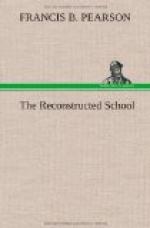Thomas A. Edison is one of the benefactors of his time. He reached out into space and grasped a substance that is both invisible and intangible, harnessed it with trappings, pushed a button, and the world was illumined. There were years of unremitting toil behind this achievement, years of discouragement bordering on despair, but years in which the light of hope was kept burning. We accept his gift with the very acme of nonchalance and with little or no feeling of gratitude. Perhaps he would not have it otherwise. We do not know. But certain it is that his marvelous achievement has made life more agreeable to millions of people and he must be conscious of this fact. At some time in his life he must have achieved a sense of responsibility to his fellows and this worthy sentiment must have become the guiding principle in all his labors. If some teacher fostered in him this sense of responsibility, she did a piece of work for the world that can never be measured in terms of salary. She did not teach arithmetic, or grammar, or geography. She taught Edison. And one of the big results of her teaching was his attainment of this sense of responsibility which far overtops all the arithmetic and history that he ever learned. The man who carried the message to Garcia is another fitting illustration of this same principle. In executing his commission he overcame difficulties that would have seemed insurmountable to a less intrepid man. He kept his eye on the goal and endured almost unspeakable hardships in pressing forward toward this goal. Somehow and somewhere in his life he had learned the meaning of responsibility and so felt that he must not fail. The world came to know him as a hero because he was a hero at heart and his heroic achievement had its origin in the training that led him to feel a sense of responsibility.
CHAPTER ELEVEN
LOYALTY
When the boy overhears a companion put a slight upon the good name of his mother, he does not deliberate but, like a flash, smites the mouth that defames. He may deliberate afterward, for the mind then has a fact upon which to work, but if he is a worthy son it is not till afterwards. Spiritual impulses are as quick as powder and as direct as a shaft of light. So quick are they that we are prone to disregard them in our contemplation of their results. We see the boy strike and conclude, in a superficial way, that his hand initiated the action, nor take pains to trace this action back to the primal cause in the spiritual impulse. True, both mind and body are called into action, but only as auxiliaries to carry out the behests of the spirit. When the man utters an exclamation of delight at sight of his country’s flag in a foreign port, the sound that we hear is but the conclusion or completion of the series of happenings. It is not the initial happening at all. On the instant when his eyes caught sight of the flag something took place inside the man’s nature. This spiritual explosion was telegraphed to the mind, the mind, in turn, issued a command to the body, and the sound that was noted was the final result. In a general way, education is the process of training mind and body to obey and execute right commands of the spirit. This definition will justify our characterization of education as a spiritual process.




